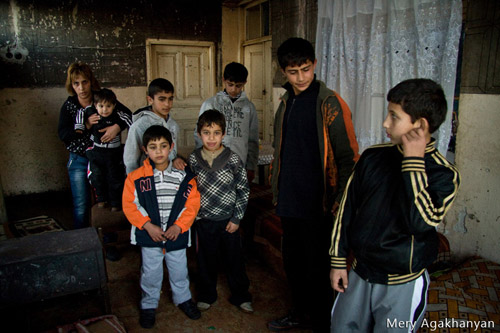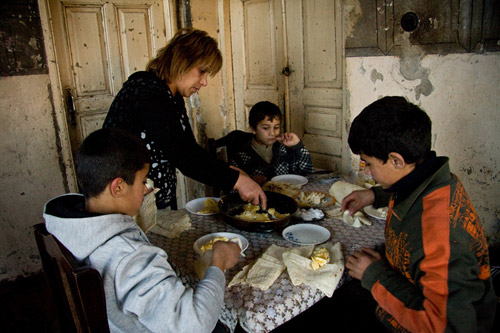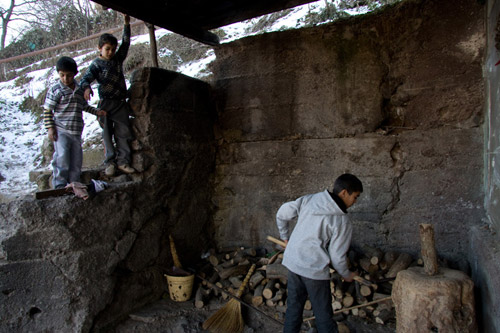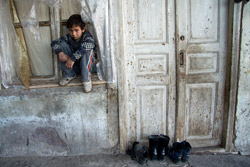http://lenahovsepyan.com/?p=172
Lena HOVSEPYAN
‘May you sit for dinner with seven children’ the folk says when blessing a newly married couple. In this family they gather for dinner with 9 children – eight sons and a daughter. The girl helps the mother to set the table…
That’s all about the romanticism in our story.
The reality is that the only wish of the well-brought up children of this modest, if not to say poor, house is peace to the world. Only after our insistent questioning they confessed they dream of a bicycle, but most of all of a ball to play football. The brothers would divide into 2 teams. One of the boys dreams of sous (a meat and potato soup) and khorovats (barbeque), while their father dreams of obtaining cattle and feeding his children with dairy products.

‘Two years ago I earned some money and bought several ewes. We got inspired, but one night a wolf attacked and killed them all. You can see our house is close to the wood.’
Elik, the mother, dreams of a permanent job (she is sure she can combine it with the house work, and you believe it seeing how vigorous she is and the way she takes care of the house and her children) and the minimum of living and sanitary conditions. 11 people live in a house without gasification and a washing machine.
Having their own house is an unrealizable wish for them – Armen says the tumbledown house was his parents’ and he must share it with his siblings. Yet, the atmosphere in this dilapidated house is surprisingly reserved.

The eldest son of the family is 18, the youngest – about 2. Armen’s, 38, and Elik’s, 36, firstborn Gevorg has been working since 13 years old, at a car wash service in the daytime and at a bakery at night.
‘We wouldn’t do without his work,’ says Elik. ‘Sometimes they call me to do some housecleaning. My husband has no permanent job. With children he cultivates our small ground area which is not even irrigated. Collect some firewood.’
The family receives only 70.000 drams ($ 181) allowance monthly. They have about 400.000 drams ($ 1036) debts at shops.
‘I feel very uneasy, but what can I do? We are always short of money. I’m grateful to them, they don’t pressure us, understand our position, believe when we promise we’ll pay,’ says Elik. ‘What we take? Only essential things – bread, vegetable oil, sugar, soap, shoes, stationary… It’s good my 4 sons study at the town’s boarding school No 1 and 5 days a week they eat and sleep there. They don’t need much to put on, but Iskuhi and Sevak go to ordinary school.’

The girl does the housework together with her mother and due to that does not regularly go to school. Sevak is a second year school boy, and the mother feels guilty for not being able to follow his study, too. But what can she do? The housework takes all her time.
‘My children miss the classes also because they don’t have clothes and shoes’.
Director of school No 2 S. Aklunts shares his concerns about the children:
‘You know, having many children, a great deal of social problems, being much occupied with the hardships is not a justification for being so much careless in the issues of education of the children and their future. May God protect them, now all 9 of them live under one shelter, but one day they will have to leave their house, to earn their own living, while the secondary education of these children is seriously endangered. I speak of only 2 of their children. It is pity, since they are capable and interesting students. The parents never have time to come to school and take an interest in their children’s study.’
‘They are good boys. I wouldn’t even compare them with some other problematic adolescents of our school. They study as much as they can, they are reserved, diligent children,’ tells about Harutyunyan brothers director V. Shalunts of the boarding school No 1 in his turn.
Aren’t the social reasons at the intersection of these two varying opinions? Little and pretty Iskuhi, is surely eager to appear among her peer with more or less decent clothes. And this social Gordian knot is only this family’s. It is only their mother that knows well what they need and how much.
‘The governor’s office lends us a hand when we apply. Sometimes, on the eve of the new academic year I have no other choice but to go to there. Since 2005 they promise to help us with the house renovation, but…,’ Elik says.

‘Why did they bear so many children, if they were not able to keep them?’ many will say. And many do. But thanks Heaven, despite what others say, in a far corner of our motherland with decreasing population, there is a family that has 9 children – Gevorg, Iskuhi, twins Ara and Artur, Alain, Gor, Sevak, Hrant and Vahe!
Armen, the father of the family while saying goodbye, either upset, or with unshakeable dignity of a Syunik man – one cannot make out – briefs his life: ‘My father was a forester and was well known in the town. Our family nickname’s also connected with the forest. My childhood wasn’t any better. I became an orphan when I was 13. We grew up somehow… There are four of us and none of us has an easy life. One of my brothers was a freedom fighter. He perished in Horadiz when the war was about to end…’ says Armen after a long pause. ‘What can we do? Everybody has his lot… But I am a happy man. I raise 8 soldiers for the motherland…’
Each Monday, 6 schoolchildren go out with their laborer brother Gevorg and on each week-end 11 people gather at the dinner table. So, Elik, come on, invent something!
… After Armen threatens it, the snow white Gabar accompanies us silently from the old and empty looking house at the brink of the forest.
We were very much concerned, touched and sad, but we left the house with 9 children and a great deal of hardships there at the brink of the forest and came back… We left a house where children sleep at least two in one bed (there are 4 beds in the house) and dream of a bicycle, a ball, sous and khorovats, where the mother washes for 11 people by hands, carrying the water from the yard and where the father dreams of keeping a cow to feed his children with dairy products. Yet, we were carrying with us the dignity of the children with clever eyes and the warmth of their hearth…
Translated by Narine Aghabekyan

